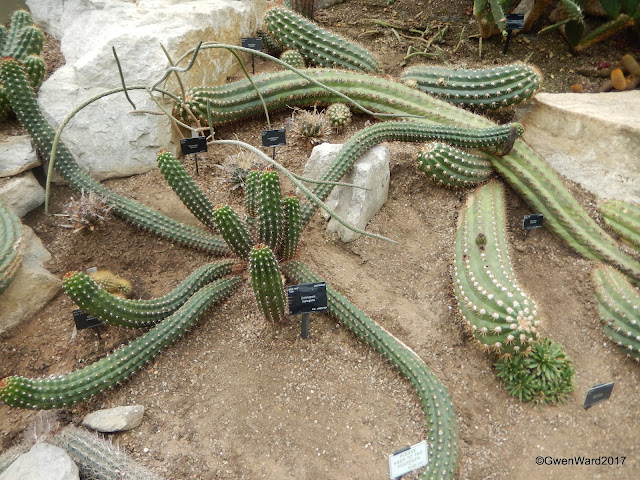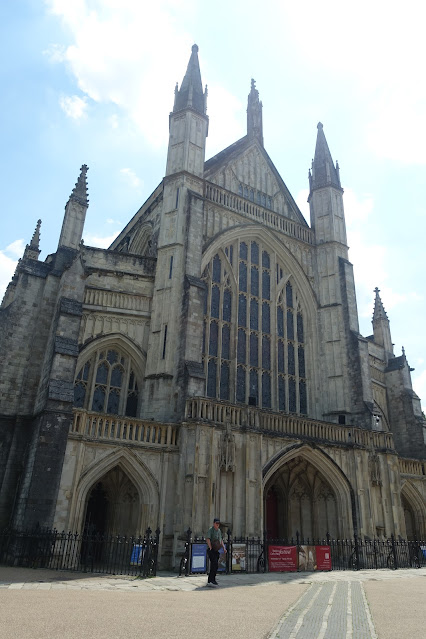Kew Gardens - A Garden Club Outing
Early in September the village Garden club went on a coach outing to The Royal Botanic Gardens at Kew. Although the skies were overcast, it was a really enjoyable day. Luckily we did not get any rain until we had to leave for our coach. These are some of the photographs I took.
The Palm House
Bedding in front of the Palm House. The Dahlias are "David Howard".
The Madagascar Periwinkle. A tender perennial, often grown as a houseplant it was traditionally used as a remedy for diabetes and digestive ailments. Two of the alkaloids found in the sap of this plant are now used to fight leukaemia and Hodgkin's Disease. The alkaloids are only found in tiny amounts. One tonne of leaves must be processed to provide one dose. In the 60's only 20% of childhood leukaemia victims survived; now 95% have a chance of remission due to the drugs developed from this plant.
I have no idea what this is called, but it is rather weid.
I did wonder who was buried under this tree - we were not missing anyone from our coach party.
View across the Thames in the distance to Sion House
End of the Palm House
Warning - Bark overload ahead!
The Lacebark Pine - on which I took the photos of the above bark.
A Temple
This Wych Hazel has its seasons muddled. It is flowering and still has its summer leaves. Normally winter flowering and the leaves are produced in summer when the flowers are over.
The Hive - we did not go inside this, but we could see the lights flashing and the humming sound when bees entered one of the beehives in the gardens. Interesting
Close up of the Hive- the red dots are the lights.
The Princess of Wales House
Ha Ha - I found a pelargonium - this is P. carnosum, a succulent type
This hanging pot of Christmas Cactus will look spectacular at Christmas - it must be almost 3' across.
Another pelargonium - P. salmoneum
And another - P. longicaule
Grasses bed
Alpine House
Rockery
Bonsai House
Vegetable Garden
Flower beds
Another view of the Temple
The Palm House
Bedding in front of the Palm House. The Dahlias are "David Howard".
The Madagascar Periwinkle. A tender perennial, often grown as a houseplant it was traditionally used as a remedy for diabetes and digestive ailments. Two of the alkaloids found in the sap of this plant are now used to fight leukaemia and Hodgkin's Disease. The alkaloids are only found in tiny amounts. One tonne of leaves must be processed to provide one dose. In the 60's only 20% of childhood leukaemia victims survived; now 95% have a chance of remission due to the drugs developed from this plant.
I have no idea what this is called, but it is rather weid.
I did wonder who was buried under this tree - we were not missing anyone from our coach party.
View across the Thames in the distance to Sion House
End of the Palm House
Warning - Bark overload ahead!
The Lacebark Pine - on which I took the photos of the above bark.
A Temple
The Hive - we did not go inside this, but we could see the lights flashing and the humming sound when bees entered one of the beehives in the gardens. Interesting
The Princess of Wales House
Ha Ha - I found a pelargonium - this is P. carnosum, a succulent type
This hanging pot of Christmas Cactus will look spectacular at Christmas - it must be almost 3' across.
Another pelargonium - P. salmoneum
Grasses bed
Alpine House
Rockery
Bonsai House
I hope you enjoyed visiting Kew Gardens































































Comments
Post a Comment
Please leave a comment - I love to know what you think of my ramblings.